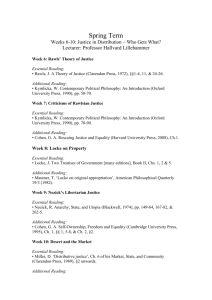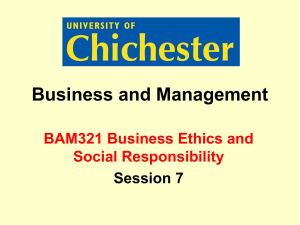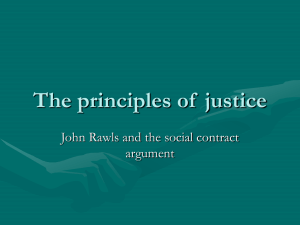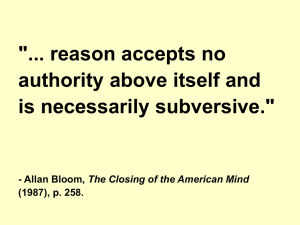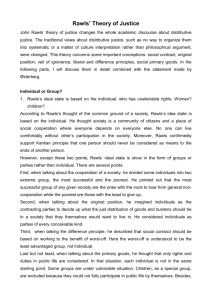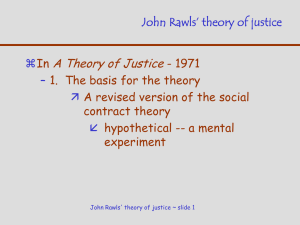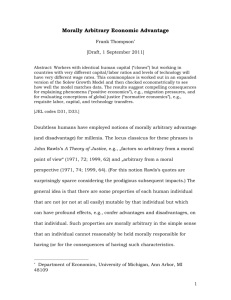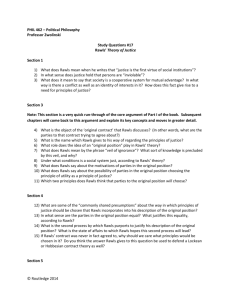Seminar essay Tuesday 5 April
advertisement
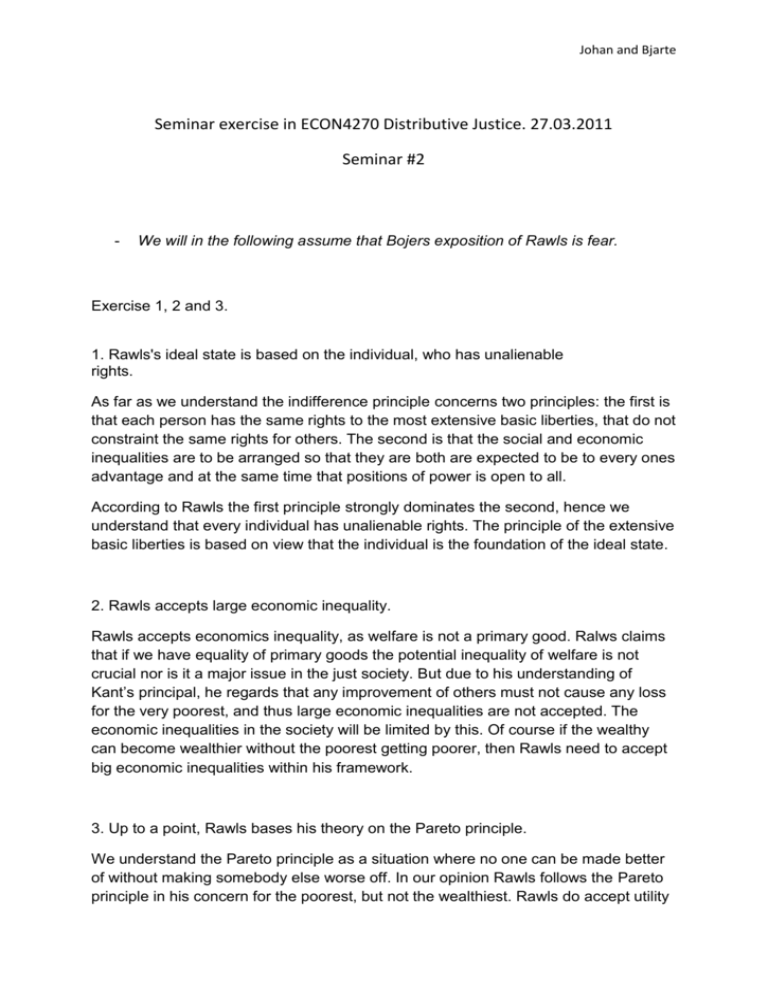
Johan and Bjarte Seminar exercise in ECON4270 Distributive Justice. 27.03.2011 Seminar #2 - We will in the following assume that Bojers exposition of Rawls is fear. Exercise 1, 2 and 3. 1. Rawls's ideal state is based on the individual, who has unalienable rights. As far as we understand the indifference principle concerns two principles: the first is that each person has the same rights to the most extensive basic liberties, that do not constraint the same rights for others. The second is that the social and economic inequalities are to be arranged so that they are both are expected to be to every ones advantage and at the same time that positions of power is open to all. According to Rawls the first principle strongly dominates the second, hence we understand that every individual has unalienable rights. The principle of the extensive basic liberties is based on view that the individual is the foundation of the ideal state. 2. Rawls accepts large economic inequality. Rawls accepts economics inequality, as welfare is not a primary good. Ralws claims that if we have equality of primary goods the potential inequality of welfare is not crucial nor is it a major issue in the just society. But due to his understanding of Kant’s principal, he regards that any improvement of others must not cause any loss for the very poorest, and thus large economic inequalities are not accepted. The economic inequalities in the society will be limited by this. Of course if the wealthy can become wealthier without the poorest getting poorer, then Rawls need to accept big economic inequalities within his framework. 3. Up to a point, Rawls bases his theory on the Pareto principle. We understand the Pareto principle as a situation where no one can be made better of without making somebody else worse off. In our opinion Rawls follows the Pareto principle in his concern for the poorest, but not the wealthiest. Rawls do accept utility Johan and Bjarte loss for the richest but not for the poorest. Reducing the wealth the well off is acceptable if this increases the wealth of the poor. But making the poor worse off, even if by doing so the majority will be better off as a whole, is not acceptable for Rawls. 4. The Pareto principle is best suited to cattle, that do not communicate. We assume that this question ought to rise a contradiction between Pareto and human social interaction and communication. If that is true, one can think of the classical example of the salve and her owner. If the two do not communicate, we can think hypothetically, that the salve owner will never now to what extent freedom is valued by the slave. And therefore not setting her free, even if the reduction in utility that gives the slave owner is far less than the utility improvement earned by the slave, and thus the total utility increases. But by doing this we are assigning values to certain utilities which is difficult at best. The fact that the Pareto principle is relative makes it a good tool for measuring utility. Furthermore one can not conclude that a happy slave is worse off than a free man. Therefore we vaguely disagree with the stated argument. 5. Rawls makes a mutually disinterested rationality the basis of life-choices. If we can interpret mutually disinterested rationality as a veil of ignorance, then this is Rawls basis for the life-choices. One chooses the composition of the society under uncertainty and thereby creating a just society, that is acceptable regardless of what your own interest might be. 6. It seems as if Rawls imagines that the most well-to-do will share their wealth with the rest of society. Rawls claims that the richest has the most to loose of non-cooperation within a society. The poorest has the least to loose. Therefore the society should be based such that the poorest maintain their voluntary wish to take part in the cooperation. One may think that this imply that the rich also will share their wealth with the rest in order to maintain the social contract. But taking rationality into account, it seems difficult to accept that a society built on the individual would make the very richest altruistic. 7. The difference principle implies that something should be done for the worst off, not that they themselves organize to improve their lives. Johan and Bjarte We understand the difference principle as a way to guarantee that every person is capable to for fill whatever life plan she might have. This includes the ability to organize their lives. Hence we can see the principle resulting in every person acting in accordance with her own free will. It is up to the individual itself if she want to improve her live. On the other hand, the worst off should, according to Rawls, not be made worse, even if their position in the society is a consequence of their own free chooses. 8. Give the choice between Rawls's just society and the Scandinavian welfare states, most people would prefer the latter. Both Rawls’s just society and the Scandinavian welfare states are supposed to secure equal possibilities. Rawls’s society gives every person equal primary goods and by that an option to for full their dreams as long as it does not make others worse off. The welfare state on the other hand ensures the basic needs, but the freedom tend to be more restricted on the moral basis of the majority and not of everybody belonging to the welfare state. Hence liberty seems to be of greater importance in the Rawls’s just society and thereby people might prefer that rather than the Scandinavian welfare states.


